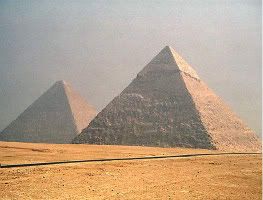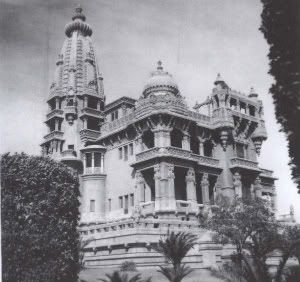Copyright © 2009 Aleya Rouchdy, All Rights Reserved
Professor Fallou Ngom commented on my previous post 'Spoken Languages - Foreign Scripts,' and sent me two articles where he discusses, among other things, the use of "Ajami" in Senegal. I will add the references at the end of this post.
Professor Ngom deals with the effect of a modified Arabic script on the phonology of African languages. He said that "the influence of Arabic in the languages he works with is primarily lexical, but the phonology of Wolof and Fuuta Jalon Pular, is virtually intact."
"Wolofal refers to the adaptation of the Arabic script to transliterate Wolof. It involves the addition of new diacritics (mostly dots called "tomb" in Wolof) on some Arabic letters to transcribe Wolof sounds that do not exist in Arabic. This system is widely used among older Senegalese Muslims." p. 110, quoted from his article on Etnic Identity and Linguistic Hybridization in Senegal.
According to Professor Ngom, the early spread of Islam (14th century) accounts for the "linguistic influence of classical Arabic. However, the Arabic language has never been used as a major medium of communication in the daily life of the Senegalese people. Its use was and is still primarily restricted to religious sphere." p.96, quoted from the article mentioned above.
Professor Ngom's research would be of great interest to anyone interested in Sociolinguistics.
Such as in the topics of languages in contact, borrowings, calques, creole, and/or identity and linguistic varieties.
References of articles written by Professor Fallou Ngom:
1. Ethnic Identity and Linguistic Hybridization in Senegal. Int'l. J.Soc. Lang. 170 (2007), pp. 95-111.
2. Sociolinguistic Motivation of Lexical Borrowings in Senegal. Studies in the Linguistic Sciences, Volume 30, Number 2 (Fall 2000), pp. 159-172.
Oct 26, 2009
Oct 23, 2009
Spoken Languages - Foreign Scripts
Kenneth J. Cooper’s article in the Bay State Banner entitled “Arabic” (10/21/09) attracted my attention, especially when I read the word ‘Ajami’ in the article.
Cooper stated that Fallou Ngom a Senegalese professor at Boston University disputes the idea that the slaves abducted from Africa could not read and write. They were writing in their own languages according to professor Ngom.
What made me add this to my blog, is the fact that Cooper in his article stated that professor Ngom “is training generation of scholars to understand that writing system, known as Ajami. It developed as a modified form of Arabic as early as the 10th century to spread Islam to Africans. The little-known script remains in use today from Senegal in the west to Zanzibar in the east.”
According to Cooper, Ngom’s aim in teaching Ajami is to view African history differently and that it “ would force people to rewrite many things.”
Alex Zito commented on the article (10/22/09) by saying that Ajami “is the term for using an adapted form of Arabic script to write an African language. Ajami, then, is not a language but a writing system. With the spread of Islam, says Zito, Arabic script was used to write the local languages: “thus Swahili Ajami in Tanzania, Hausa Ajami in Nigeria, Fulfulde Ajami in Guinea, Wolof Ajani in Senegal.”
Europeans missionaries developed writing systems for African languages using Latin alphabet. According to Zito, who is writing his dissertation on Wolof Ajami in Senegal, Ajami predates the Latin systems.
Hence, Arabic alphabet was used to write the local African languages. This reminds me of the Nubian language in Egypt written also in Arabic. However, in the case of Nubian the contact with Arabic has affected the Nubian language and led to a tip to the dominant language, Arabic. Interference has affected the phonology, morphology and syntax of Nubian in general.
Hence, Arabic alphabet was used to write the local African languages. This reminds me of the Nubian language in Egypt written also in Arabic. However, in the case of Nubian the contact with Arabic has affected the Nubian language and led to a tip to the dominant language, Arabic. Interference has affected the phonology, morphology and syntax of Nubian in general.
What is of interest to me is Zito’s statement that it would be significant to find out “the extend to which people took their Quranic education and familiarity with the Arabic alphabet and used it to write their own languages, at the same time translating ideas and texts from the Arabi-Islamic world into their local cultural environments.” This is again similar to what happened to Nubian. Nubians are Muslims, and by learning the Quran they also learned Arabic, and the Arabic script.
Some missionaries did write Nubian using the Latin alphabet, however, Nubians themselves wrote their language in Arabic. Among them is the late Nubian, Youssef Sumbagh, who wrote a Nubian grammar and Nubian dictionary using Arabic alphabet.
I think that professor Fallou Ngom, as well as Alex Zito’s work on Ajami can lead to many linguistic discussions on spoken languages maintained by using foreign scripts.
Kenneth J.Cooper by writing the article on professor Ngom teaching “an adapted form of Arabic script to write an African language” has opened the door for a dialogue among linguists interested in discussing spoken languages maintained by using foreign scripts.
Oct 12, 2009
Demise of the Arabic Language in Egypt
Copyright © 2009 Aleya Rouchdy, All Rights Reserved
Recently in Egypt, there has been many discussions regarding the obvious regression in the teaching and in the use of the Arabic language.
In an Arabic TV interview in Egypt, Dr. Ahmad Darwish, member of the Academy of the Arabic Language,* began his discussion on the status of the Arabic language with a question: "why do we demean our mother tongue?"
Of course, due to the phenomena of language contact, Arabic-English, borrowings cannot be avoided, especially the borrowing of technical and scientific terminologies in both colloquial and fusHa. This is acceptable since it is time consuming to begin translating every technical word before pursuing any research or scientific discussion.
The major problem according to Dr. Darwish, lies in the educational system in Egypt that allows the regression of Arabic in schools. According to him "we are the cause students hate the language."
Many private schools do not teach Arabic in Egypt. The language in each of the private school (German, French, English) becomes the primary language of education. Even if Arabic is taught in some private schools, incompetent language teachers whose methods discourage students usually teach it.
Dr. Darwish concludes by saying that every civilized nation strives to protect its mother tongue, while in Egypt we are assaulting our language. Our mission in the Academy, he further states, is to make sure that the language 'is to be used as a gateway to national renaissance rather than being driven to the tomb.'
I could not resist adding this post after hearing the interview with Dr. Darwish on the Egyptian channel Al Masriyya.
Any comment will be welcomed.
*NB: The Academy of the Arabic Language in Egypt was founded in 1934 in order to develop and regulate the Arabic language.
Recently in Egypt, there has been many discussions regarding the obvious regression in the teaching and in the use of the Arabic language.
In an Arabic TV interview in Egypt, Dr. Ahmad Darwish, member of the Academy of the Arabic Language,* began his discussion on the status of the Arabic language with a question: "why do we demean our mother tongue?"
Of course, due to the phenomena of language contact, Arabic-English, borrowings cannot be avoided, especially the borrowing of technical and scientific terminologies in both colloquial and fusHa. This is acceptable since it is time consuming to begin translating every technical word before pursuing any research or scientific discussion.
The major problem according to Dr. Darwish, lies in the educational system in Egypt that allows the regression of Arabic in schools. According to him "we are the cause students hate the language."
Many private schools do not teach Arabic in Egypt. The language in each of the private school (German, French, English) becomes the primary language of education. Even if Arabic is taught in some private schools, incompetent language teachers whose methods discourage students usually teach it.
Dr. Darwish concludes by saying that every civilized nation strives to protect its mother tongue, while in Egypt we are assaulting our language. Our mission in the Academy, he further states, is to make sure that the language 'is to be used as a gateway to national renaissance rather than being driven to the tomb.'
I could not resist adding this post after hearing the interview with Dr. Darwish on the Egyptian channel Al Masriyya.
Any comment will be welcomed.
*NB: The Academy of the Arabic Language in Egypt was founded in 1934 in order to develop and regulate the Arabic language.
Oct 7, 2009
دعاء مدرّسة لغة عربية تزوج عليها زوجها
اللهم اجعله مكسورا عندها منصوبا عندي
اللهم اجعلها من أخوات كانت .... وأجعلني من أخوات صارت
اللهم اجعلها مفردا واجعلني جمعا
اللهم اصرفه عنها واجعلني ممنوعة من الصرف
اللهم أجعل معاملتها بالشدة والجزم ..... واجعل معاملتي بالضم والسكون
اللهم اجعله عندها ظرف ...... واجعله عندي حالا
اللهم اجعله عندي مبتدأ واجعله عندها خبر
اللهم اجعله عندي فاعلاً واجعله عندها مفعولاً به
اللهم اجعله عندي مرفوعا واجعله عندها مجروراً
اللهم اجعله عندي معرباً واجعله عندها لا محل له من الاعراب
اللهم اجعله عندي جمع مذكر سالماً واجعله عندها فعلاً ماضياً ناقصاً
اللهم اجعله عندي فعلاً صحيحاً واجعله عندها فعلاً معتلاً
اللهم اجعله عندي ضميراً متصلاً واجعله عندها ضميراً غائباً ...........
Contributed by Arabic teacher Dunya Mikhail
Subscribe to:
Comments (Atom)




